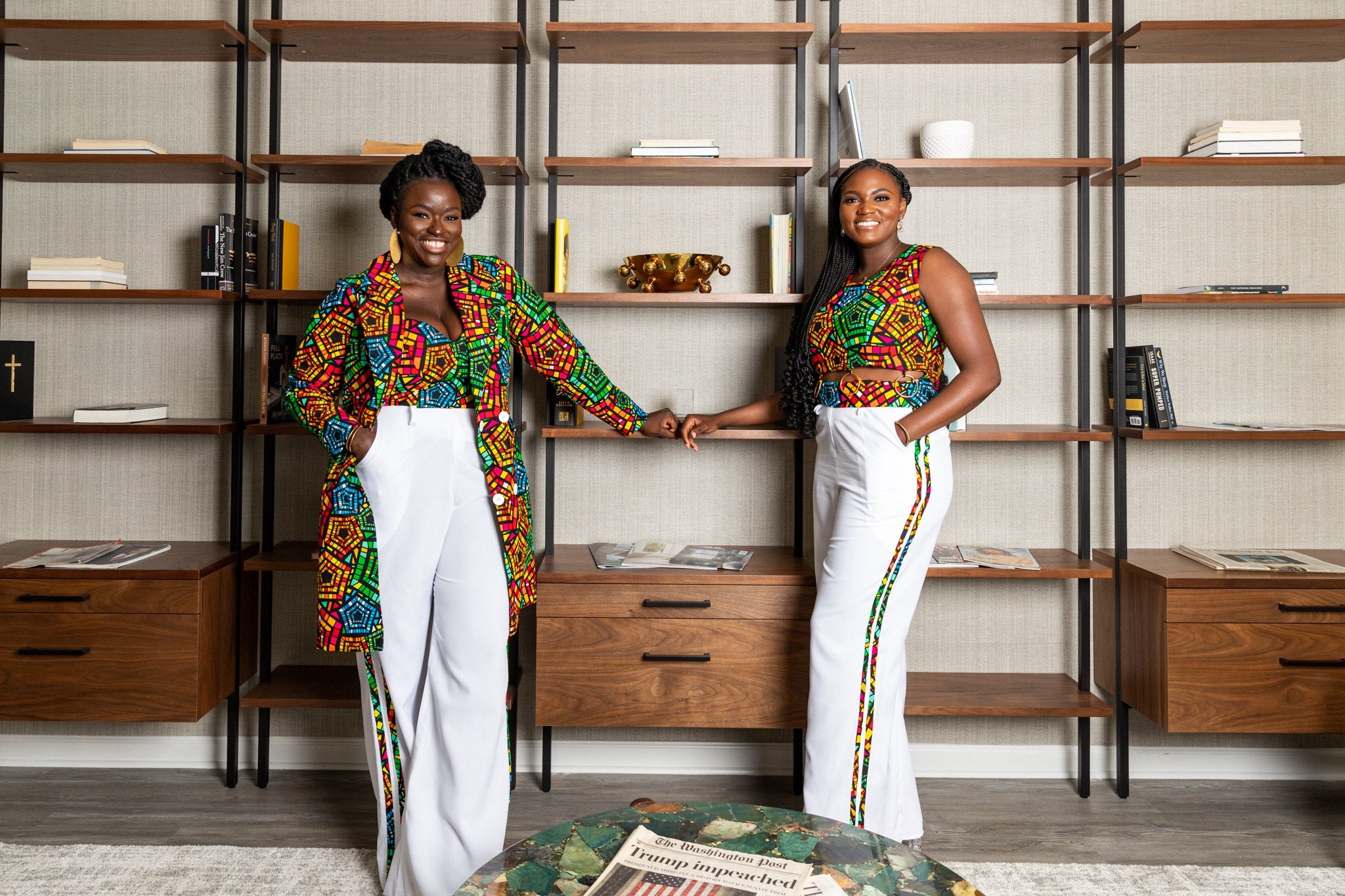The 50 States Project is a series of candid conversations with interior designers across the country about how they’ve built their businesses. This week, Elle Odoi and Yvette Pappoe, the co-founders of Silver Spring, Maryland–based design firm Décorelle, tell us about the unexpected way their family business arose, how they balance their original mission with their vision for growth, and the lessons they’ve learned about putting inner peace above financial success.
What was the aha moment that led the two of you to start this business?
Elle Odoi: We’re sisters—well, we’re actually cousins, but we were raised together from birth. I have a very heavy right brain, and I realized growing up that I had a gift for putting spaces together. We’re from Ghana, and every time my dad would travel back to Africa, he would come back to a different [setup] in the house. At first, he would say, “What is this?” Then he would take a moment and was like, “Oh, wow, this is actually really nice.” It continued into college, where I won the dorm room wars [room-decoration competition] every single year. But I didn’t think anything of it until a friend of mine was moving back to the States from Ghana and asked if I could help her and her husband set up their town home. It was a tiny budget, but we managed to do it, and we took pictures. It was during that project that I really felt like, “Oh, this is something I could do on the side for fun.” And for Christmas that year, Yvette surprised me by registering the company.
Yvette Pappoe: The aha moment came from seeing the joy in her spirit doing the work. I knew that she could do more, and she just needed that push. I came up with a name, registered it and said, “Hey, here’s a gift. You can take it or not.” From there, we’ve been holding each other’s hands. I’m the left brain of this situation—I’m a lawyer by training and an educator, and that’s my day job, and the operations, finances and marketing are my expertise.
Odoi: I always say that she saw more potential in me than I saw [in myself]. I was in the medical field—a quality assurance specialist for a mental health company, and then an administrative director—and I always thought design would be something to do for friends and family. But when we posted those first pictures of the town home on Instagram and announced [the company], no one was too surprised because they had already seen how creative I was.
It’s been room by room, little by little, since then. We [went from] doing a lot of things ourselves—painting and hanging things, building furniture from Ikea, whatever we could get our hands on—to the budgets that we have now, where we’re building houses from top to bottom. We figured it out as we went and have grown the business organically.
When did the company become your full-time job?
Odoi: Four years ago. As Décorelle was really growing, I would find myself taking calls from contractors at my day job, and it became a bit overwhelming. In 2019, I was working at an advertising agency and wasn’t quite happy, and my sister was like, “You know, we’re doing pretty well. You could take the rest of the year off.” It was September, so I was like, “OK, I will just take a few months off and look for another position.” But I realized that I could dedicate the time to the company and take on more projects, so I just kept doing that. Four years later, I have not gone back to work for anybody.
I have an idea of what I want Décorelle to be. We are not there yet, but I’m grateful for the growth that we’ve had. It’s never been easy, but we’ve also never backtracked—we’ve continuously increased in profit.
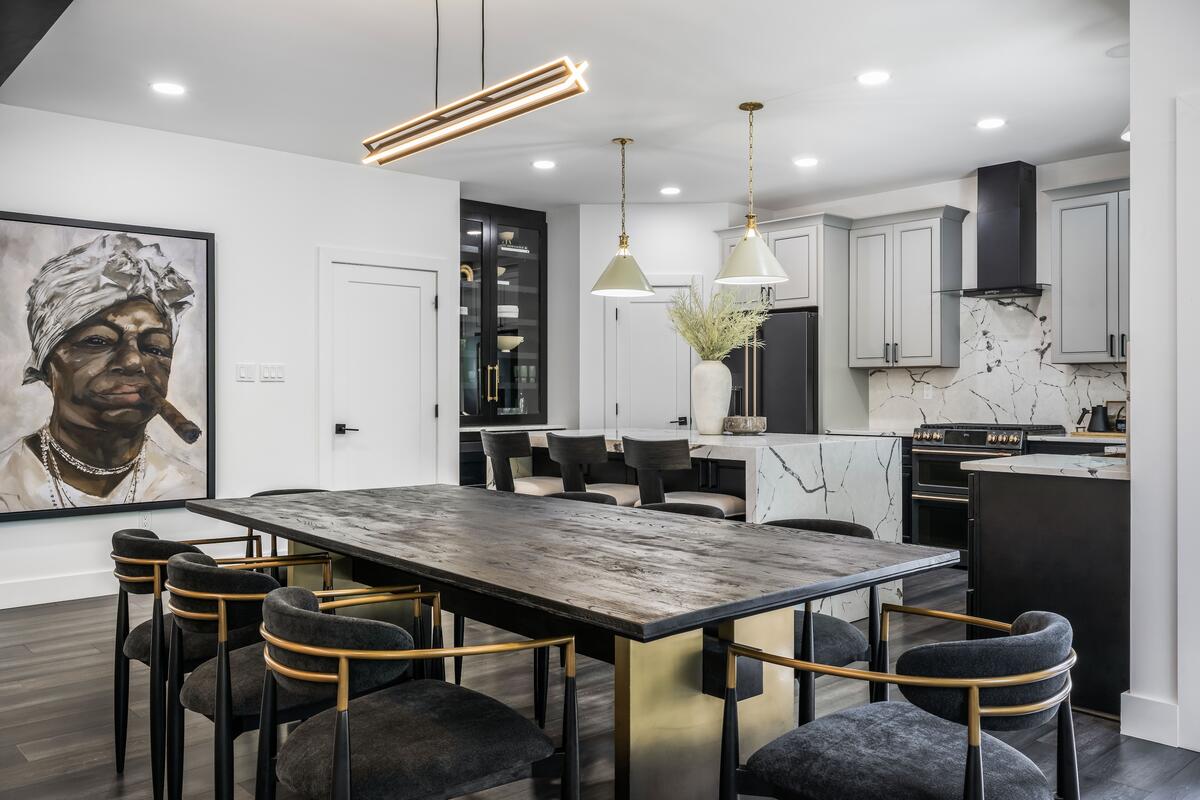
Where do your leads come from today?
Odoi: Half come from social media, and the other 50 percent is word-of-mouth.
How do you think about social media as a driver for more work?
Pappoe: [Our focus] is on genuine interactions and organic posting. We try not to Photoshop too much, and we don’t try to hide the behind-the-scenes process. We’re very open, very transparent, and we aim to educate. It’s not just pretty pictures but also the work it takes to get to that pretty picture, and sharing all of that really does help grow the following.
Our overall mission with the company was to make interior design more accessible. When we started, design in this area was essentially white, male and rich. We are neither white nor male, and we’re not rich yet, so we sought to carve out a space for people like us—middle-income people who like nice things and deserve a home that feels and looks good. That’s been our niche.
How do you make sure that you’re talking to those folks on social?
Odoi: It’s about being able to say, “You don’t have to give us $300,000 to get everything done all at once. You can pace yourself.” We have bigger projects, but we also have clients who have been with us for years because they do one space at a time. When I’m posting, I share where certain things are from so that they realize you can go to the store and get these things yourself—not everything, but a lot of these things are very accessible to you. When you see a bachelor who just bought his first town home, you know that Décorelle does town homes, and they do it wonderfully. Or [you’ll see that] we did a client’s primary bedroom, and now we’re here to do their basement. They get to see that, and they can relate to it.
Many designers feel it’s hard to run a company that doesn’t focus on bigger jobs with bigger budgets—that there’s a real business benefit to working with wealthier people. How have you found a way to balance that mission with the need to be profitable?
Odoi: It’s very difficult, and it’s something that we continuously talk about. I always say that I design with $1 million in mind—and I think my clients will say the same, because when you walk into their single-family home, you don’t expect to see what you see after Décorelle has had a hand on it. To me, that just goes to show that if we did have a million-dollar project—I mean, can you imagine what I would do with that?
Pappoe: [My role] is to remind the right-brained person that, yes, of course you want to push the boundaries, but these are the people we sought out to serve. So maybe we do [work with] some higher-end folks [whose projects] help the business run. But I think that in the long run, keeping with the course will benefit everyone, including the clientele that we’re looking to attract.
That’s one of the most beautiful answers I’ve ever gotten to that question. I feel like so many people just say, “It was too hard. We gave up.”
Odoi: It’s definitely not easy, especially in the beginning, when we were anxious to know when money was going to come in. But then, over the years we’ve noticed the trends of when we become very busy.
When is that?
Odoi: After tax season. It’s crickets between December and March—we’re still busy working on other projects, and we’ll get maybe one or two bookings. But we get the majority of our revenue from projects booked at the end of spring into summer. Knowing these things doesn’t stop the anxiety, but it does help a little bit.
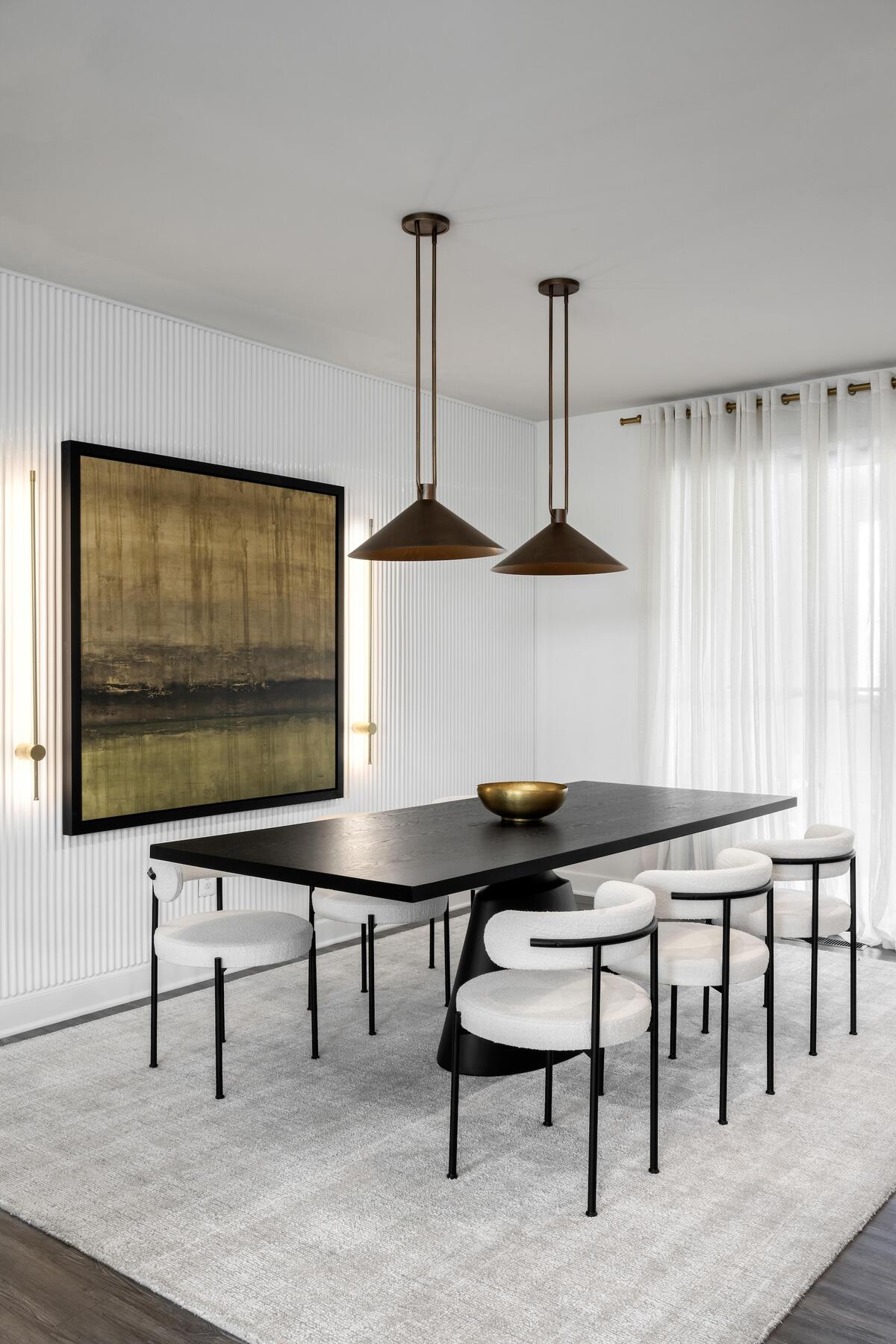
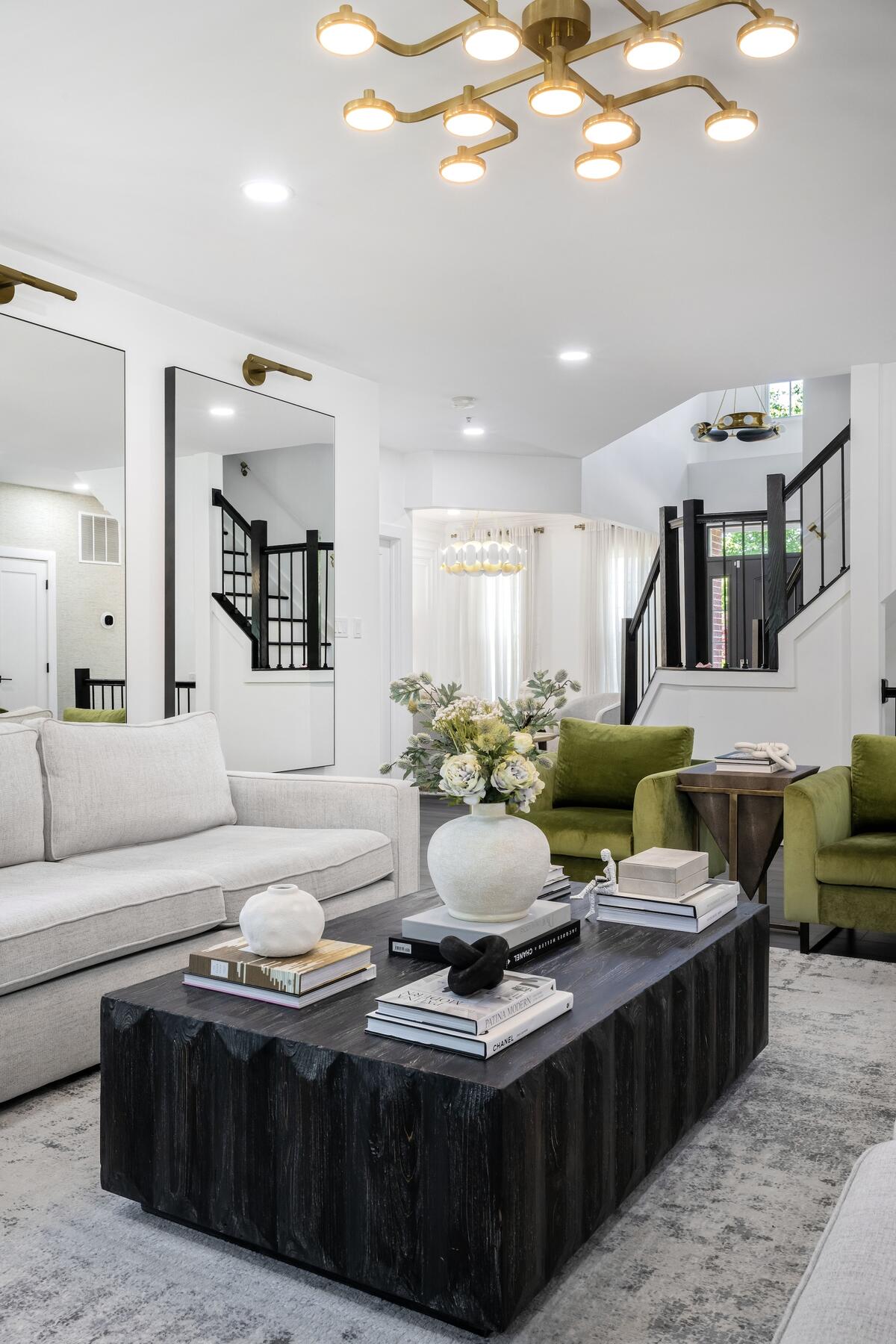
How did you approach setting a rate and choosing a way to charge for your work?
Pappoe: We charge a flat fee per room. The thought behind it is that we don’t like to put a limitation on our creativity. Charging hourly just wouldn’t make sense for our niche market. And then for full renovations or projects that are construction-heavy, we charge a percentage of the overall construction and furniture budget. Our final service is remote design, or e-design, which is also a flat fee.
You start with a complimentary 20-minute call. How does that act as a funnel for prospective clients?
Pappoe: We introduced that in the last two years. Before that, we found that people would book paid consultations, and then we would drive out to the space, meet with them and never hear from them again. We realized that it was a lot of people trying to pick a designer’s brain—like, “What do you think I should do with this room? How do you think I should rearrange this furniture?” That’s not what this is about.
The discovery call was implemented to get a better read on who is inquiring, and whether they’re a good fit for us, and us for them. When you book an inquiry call with us, you get what we call a full-service investment guide, which gives you our pricing and our process so that you have an idea of what you’re getting yourself into. That helps weed out people who are just fishing for how much information they can squeeze from Elle. I handle the discovery calls because I don’t know anything about design. So maybe they think they’re going to get a 20-minute call where they can say, “Oh, I’m thinking about painting my living room,” but then I get on the call, and I’m like, “OK, let’s talk process, budget and timeline.”
I’m asking things like, “Are you looking to renovate, or are you looking to style only?” “Is it a new build or an old home?” “Do you have children?” I can also [tell if] they’ve actually looked at the investment guide and agree with the budget. If you’re looking to do three rooms and your budget is $20,000, it’s not a fit, and we [all] determine that without having Elle drive 20 miles to the space. That saves us time; that saves you time. We’re also just not in the business of collecting money for money’s sake. It has to be the right working relationship, the right vibe. If someone wants to be involved every single step of the way, that’s not how we work. If you’re the type of person who only wants us to source from Wayfair, that’s not going to work either. No offense to anybody, but these are long relationships, so we have to make sure that we’re a right fit for each other, not just that the customer has money.
Odoi: We’re probably honest to a fault, and we realize that money isn’t everything. We have turned down some life-changing money because we realized that it would be really toxic to work with that client. Not all money is good money—we’ve definitely learned that in this business.
What does your team look like now?
Odoi: It’s the two of us, with me doing the design and Yvette doing operations; and then we have an assistant who does all of our administrative work and a full-time procurement specialist who orders everything and updates clients on shipments.
Beyond that, we’ve had different people come in and out. We really want to expand, especially me. It would give me immense relief not to be the person designing every single space, but it’s been hard to find a junior designer whose hand I don’t have to hold.
We’ve been talking a lot about procurement at BOH lately. How did you approach that hire, and is it the game-changer everyone says it is?
Odoi: It really is. I used to spend weeks ordering and balancing Ivy and our accounting, making sure that invoices are paid on time, communicating with delivery companies to make sure that things aren’t damaged—and she handles all of that now. That’s something I would never take back. It’s a role that I will make sure is always filled, because I can’t imagine adding that back to my to-do list.

Can you tell me about your local design scene?
Pappoe: We’re very blessed to be in the DMV—that’s the D.C., Maryland, Virginia area. It is filled with professionals, our niche market, so servicing this area has been a blessing. But with that comes competition.
People are buying homes here, sure, but by the time they finish buying, they’re spent—there’s nothing left to use for this luxury service. And so that’s definitely impacted us quite a bit.
Odoi: We’re also in an election year, not to mention a cost-of-living crisis. In Ivy, I’m able to clip thousands of different furniture pieces [and store them in our software for easy reference], so I can literally see a piece of furniture that we clipped in 2019, how much it cost then, and what the cost is now. I can see how that CB2 vase has increased in price.
Where are you shopping and how are you sourcing?
Odoi: Yvette and I have attended High Point Market a few times. I keep one of their catalogs on my workstation for whenever I’m sourcing and I want something different. I have my go-to vendors, and I’m really trying to diversify. But it’s often easier to stick with [ones you know] because you know the quality you can get, or that the shipping doesn’t take as long, or that it’s not a headache working with this company if something comes in damaged.
I’m always sourcing. I went to a beautiful restaurant and I loved what they did, so I took a picture and reverse-image-searched it on Google. When Yvette and I went to the U.S. Virgin Islands, there was a particular light that we just loved, so she took a picture and we reverse-imaged it, and we were able to learn so much. We will look at tags on pillows and couches. I think that’s the only way you can improve—just expanding and learning as you go. I don’t know it all, so if I see something that I love and I don’t know where it comes from, I try to figure it out.
It’s the same with architecture. I will look at how hotels are designed and say, “How do they do this?” I’m not traditionally trained. I didn’t go to an interior design school. So I’ve learned as I go. I remember when we started, our receivers said, “We have the BOL,” and I literally had to Google it. I sat myself down and researched in order to know how to properly pronounce the different parts of a staircase. I’m always learning, just like I’m always sourcing. I’m always open to finding out.
Staying open can be such a superpower. When you look ahead, what is the next big challenge for the design industry and for your business? What do you see brewing ahead?
Odoi: For our business, I have a little bit of fatigue at the moment, to be honest. I think clients can get a little bit—what is the word?
Pappoe: Entitled.
Odoi: Entitled, thank you. I think when you’re dealing with huge sums of money, there’s this misconception that you owe them your entire week from Monday to Sunday. Again, Yvette and I are quite honest people, and I think we’re a little too nice, and it does take a toll on my mental health having to continuously apologize for things that have nothing to do with us. You know, if a furniture item is backordered? I don’t know what to say about that. And if you want me to source [additional items] after we’ve approved everything, then you’re going to have to pay my sourcing fee. When you’re trying to put your foot down and establish these boundaries, it can get a little tricky, and sometimes it almost feels like they don’t value you trying to run a legit business.
It’s like, “Oh, we’ve paid you all this money—why can’t you source an extra table? Or why can’t you cancel that order, and then we can find a new one?” That’s not how it works. The table has to fit in that space, and it has to have a certain look, because we already have an entire design established for that room. It’s not as easy as it seems. Right now I’m [dealing with] a little bit of mental fatigue, and I’m not sure if I [might] want to take a break from the residential side of things.
As an industry, I think we’re getting into a technology world where people see an ad that used AI for a room design, and [think artificial intelligence] is going to re-imagine the space for them. People don’t realize that there’s certain things that computers can never do. They can never project-manage for you. They can never talk to your contractors and make sure they do certain things correctly. So that part makes the job feel a little bit more secure. But the influx of new technology is shaking the foundation a little bit. I don’t necessarily think it will ever uproot [the traditional design industry], but I want to stay ahead of the curve in knowing how to pivot our business. I still want to do interiors, but it may not necessarily be customer- or client-focused. It might be something else.
You have a retail store coming soon. Can you tell me a bit more about that?
Odoi: We were blessed to win the Boost Program, which brings small businesses back into Baltimore City. We’re opening a retail store in the downtown area and launching an accessory line. We will have certain furniture pieces, but it’s a small store. It’s gonna be a storefront, plus a small office. So we’re going to officially have a physical location where we can go in and have team meetings and do client presentations. We have beautiful hand-made pottery coming from Mexico; we have a candle that’s launching; we have different home accessories that we’re working on. There’s a lot of work to do, but we’re very excited and hoping to open this summer.
What do you hope retail adds to the business?
Odoi: Definitely profits. Again, we want to pivot, so doing the behind-the-scenes [design and curation work], product launching and sourcing my own products was very interesting. It’s something that I enjoyed, but it’s quite labor-intensive. So I’m [wondering], “Do I want to be more retail-focused, where it is a quick client interaction business?” You come in, you buy what you need, and you’re done. It’s very quick, which is really what I’m looking forward to, as opposed to having a client that’s with you for two years because you’re doing a huge renovation. I don’t enjoy that anymore. Retail gives us that quick interior design aspect. And it kind of takes away the issues that we’re dealing with now. It’s a new customer base, and it’s a different field, so it’s going to be quite interesting, but I think we’re up to the challenge.
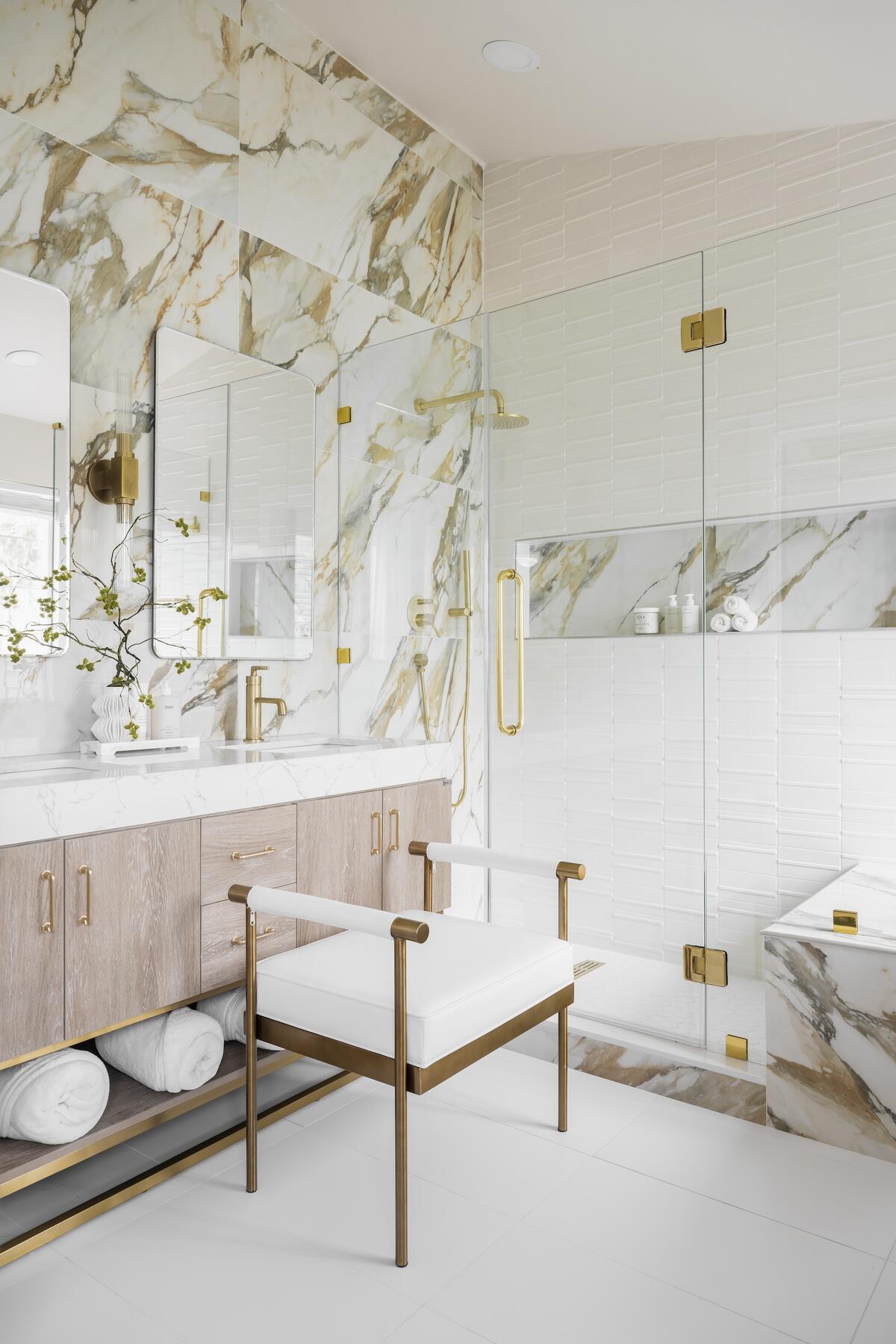
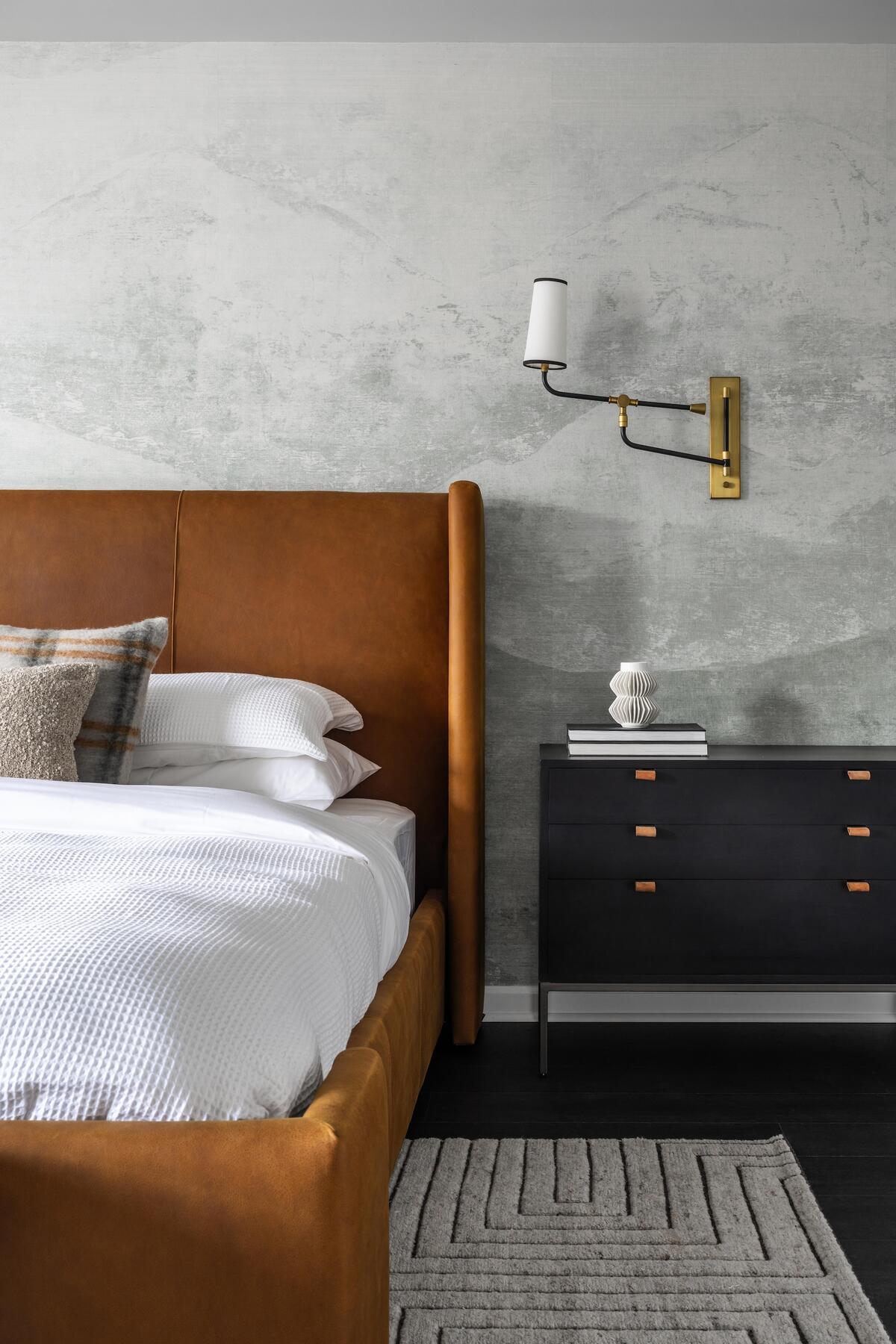
What is the biggest thing that you know now that you wish you had known when you launched the firm?
Pappoe: I wish I had known more about process. To me, it was like, “How hard can it be, right? They want something pretty and nice and quality, and we’re going to give it to them.” But I didn’t realize how impatient people are, and how your internal business processes can influence or impact the clients you attract. I wish we would have had those processes in place earlier to save some headaches for both sides—the business and some clients we work with as well.
Odoi: It’s definitely that. Also, customer service: I didn’t realize we would have to be therapists, teachers—parents, almost. We have to have so much patience. I think if I had known it would be to this extent, I might have kept the company as an e-design thing so that we wouldn’t have to do any project management.
What does success mean to you in this business?
Odoi: I don’t even think it’s financial to me, because we didn’t come into this business to make so much money. [If it was just about] that, we’d be charging way more for the quality of designs that we do. Honestly, we do amazing work and we grossly undercharge. I think success is having the kind of firm that I want, having a team of seven full-time people in an office, taking fewer projects per year, but quality projects. Success is more [about] how I feel about the company than anything else. If Yvette and I are both at peace with how the company is running, [and are doing well with] our mental health, to me that smells more of success than, “Oh, we made a million dollars this year.” We can make a million dollars this year and be stressed out of our minds. I would rather make less money and be 100 percent happy. I prefer those projects, actually.
Pappoe: I definitely agree. We’re on the same page there.
To learn more about Elle Odoi and Yvette Pappoe and Décorelle, visit their website or find them on Instagram.
















